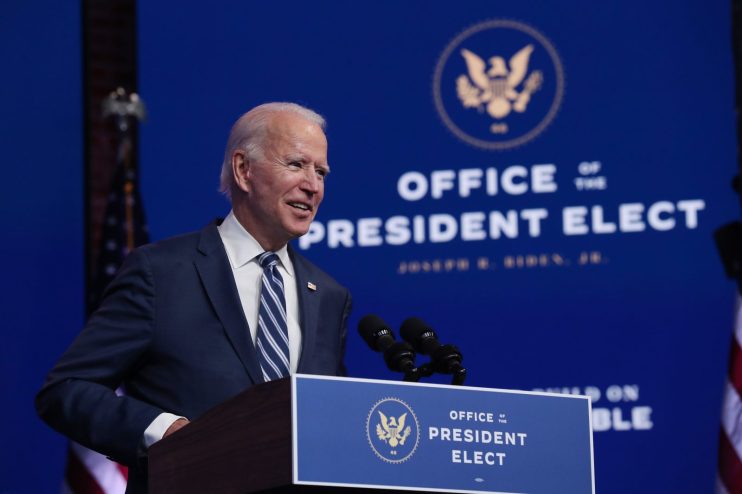Begone Trumpist protectionism! How Biden will boost prospects for global trade

We cannot be sure on the exact order in which European leaders were contacted by the US President-elect, but we do know that Boris Johnson was among them early on, silencing the hysteria that our Prime Minister might be snubbed.
Fears have abounded during this US presidential race that a Joe Biden win would result in an altogether cooler relationship than has been customary between the UK and American leaders in recent decades.
But instead, both sides appear to be seeking common ground on which to build ties. In a tweet preceding that much-hyped call, Johnson wrote that “The US is our most important ally and I look forward to working closely together on our shared priorities, from climate change to trade and security.”
With Brexit deadlines looming, the second of these policy priorities is of pressing importance. Donald Trump has been supportive of the UK’s departure from the bloc, is known to be critical of the EU, and has vocally backed the idea of a US trade deal with Britain. And yet, all the enthusiasm from America’s leader and our own Prime Minister has not been enough to get one over the line.
For proponents of free trade, Biden therefore represents a welcome counter to Trump’s protectionism, albeit one who favours tax rises and further increases in government spending.
Trump, as we are all aware, was hardly a free-marketeer’s dream. The President presided over America’s withdrawal from the Trans-Pacific Partnership, he announced tariff and non-tariff barriers against China and EU countries, and famously said that “trade wars are good, and easy to win”. He has proved a provocative negotiator, reopening the North American Free Trade Agreement with Canada and Mexico and signing a replacement that threatened the reimposition of import tariffs if, among other things, lower wages in Mexico were seen to be hurting US competitiveness.
As the Trump administration is consigned to history, we can expect a Biden presidency to adopt a more liberal internationalist approach. We will see re-engagement with bodies like the WTO and a reversal of the kind of hostility that led Emmanuel Macron to fear a “brain death of Nato”. And while some Democrats took a more radical stance during the campaign, we should remember that Biden has plans not for the “Green New Deal” championed by many in his party, but for the US to take a more moderate course by rejoining the Paris Climate Accord.
A reversal of Trump’s stance on trade, whereby every decision was “made to benefit American workers and American families”, is welcome — for the rest of the world, and indeed for the US too. According to a wealth of research, it is free trade and not protectionism that brings the greatest benefit to ordinary families: directly, by providing wider access to more and cheaper products, and indirectly, by allowing the specialisation of production to enhance productivity.
The initial months of Biden’s presidency will be rocky, no doubt. Unlike Barack Obama, Biden won’t seek to put a post-Brexit UK “back of the queue” when it comes to trade, but he will push the UK to sign a deal with the EU first — inevitably weakening the UK’s hand at a critical moment in the Brexit negotiations. The President-elect, who is of Irish heritage, has also warned Johnson not to let Brexit destabilise the Northern Ireland peace process.
But Biden will want good relations both with and between the UK and EU. He knows that, as I have witnessed first-hand in the European Parliament, trade policy is a vital instrument in foreign affairs.
One of the motivations behind the US-EU Transatlantic Trade and Investment Partnership (which has been put on ice for some years now) was to unite against China’s ambitions to set the rules on international trade and finance. And just as Johnson is seeking to find common ground with the US from which to grow a new kind of special relationship (perhaps like the one between Harold Macmillan and John F. Kennedy), so a new Democratic administration will look to cooperate with both the UK and EU on threats from Russia, Iran, China, and other illiberal regimes.
Finally, although Biden in the White House will have far-reaching consequences for the UK, these should not be overstated. Regardless of who sits in the seat of power on either side of the pond, the UK and US will remain allies through a plethora of international governmental organisations, and both countries’ pursuit of international agreements could give a much-needed impetus to trade negotiations.
It has been said before but is always worth reiterating: trade is critical to our prosperity. It fuels economic growth, supports jobs, raises living standards, and ensures more affordable goods and services. As Britain fights its way out from the Covid crisis, pulling the economy back over the cliff from which it was hurled in March 2020, this renewed momentum is exactly what we will need.
Main image credit: Getty